TBI Toolkit
TBI 101 Pages: Adult | Resources for Youth
Background | For Parents | For Educators | For Healthcare Professionals
Resources for Parents
Mild TBI/Concussion | Moderate to Severe TBI | Transition into Adulthood | Websites | References
Mild TBI/Concussion
REAP: The Benefits of Good Concussion Management
For more on good concussion management see materials from the Rocky Mountain Hospital for Children Center for Concussion.
Remove/Reduce
Educate
Adjust/Accommodate
Pace
How every family, school and medical professional can create a Community-Based Concussion Management Program. Visit: REAP: The Benefits of Good Concussion Management
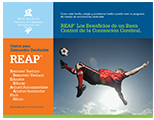
REAP: Los Beneficios de un Buen Control de la Conmoción Cerebral
Como cada familia, colegio y profesional medico puede crear un programa de manejo de conmociones cerebrales. Visitar: REAP: Los Beneficios de un Buen Control de la Conmoción Cerebral
As part of Heads Up Concussion materials, the Centers for Disease Control and Prevention (CDC) has prepared a "Concussion Fact Sheet for Parents".
Heads Up Concussion - Parental Fact Sheet
Return to Learn
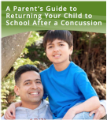
The Defense and Veterans Brain Injury Center has developed a guide to help parents facilitate their child's return to school. Common questions addressed in the guide include:
- "How soon should my child return to school after a concussion?"
- "When will my child feel better?"
- "What can I do to help?"
To download the guide go to: DVBIC - Resources
In addition, Children's Hospital of Philadelphia as developed a number of resources for parents including a video regarding Frequently Asked Questions on returning to learn after a concussion, as well as a 4 Step Return to Learn Plan. Children's Hopsital of Philadelphia - Return to Learn
Return to Play
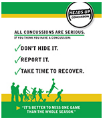
The CDC has developed a toolkit for parents called HEADS UP to Youth Sports: Parents. For more information see: Center for Disease Control - Toolkit for Parents
Also from the CDC: "After a concussion, an athlete should only return to sports practices with the approval and under the supervision of their health care provider. When available, be sure to also work closely with your team’s certified athletic trainer." In this article, 6 steps that should be taken for a safe return to play are presented. Visit the CDC Heads Up: Returning to Sports and Activities
Moderate to Severe TBI
Return to Learn: Individualized Education Plans (IEPs) and 504s
Children who sustain more severe injuries may require long-term assistance to return to the classroom. For more information regarding IEPs and 504s see: Colorado Kids with Brain Injury - Educational Information
BrainSTARS
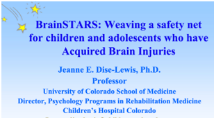
The BrainSTARS manual was developed by Jeanne E. Dise-Lewis, PhD and her colleagues to help parents and teachers work collaboratively to facilitate children's recovery post-brain injury. Chapters and tools from BrainSTARS are available at: BrainSTARS
A PowerPoint by Dr. Dise-Lewis titled, "BrainSTARS: Weaving a safety net for children and adolescents who have Acquired Brain Injuries" can be found at: BrainSTARS: Weaving a safety net for children and adolescents who have Acquired Brain Injuries
Tools for Daily Living
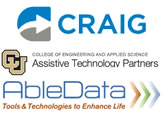
The Colorado Kids Brain Injury Resource Network has compiled resources to help facilitate psychosocial functioning. These include:
- General Adaptive Technology Resources
- Specific Topic Areas
- Managing Schedules/Tasks
- Tasks Affiliated with School
- Driving
For more information see: Colorado Kids with Brain Injury - Tools for Daily Living

Talking with Children about Moderate to Severe TBI
The Defense and Veterans Brain Injury Network has developed a booklet in which communication techniques are presented to help adults talk to children about their loved one who may have sustained a moderate to severe TBI. For more information see: DVBIC - Resources
Transition into Adulthood
The Colorado Kids Brain Injury Resource Network has a number of resources to help families and children living with TBI transition into adulthood. As noted on the website:
"Planning for the transition from high school to college or vocation training, employment, and independent living should begin early in your child’s high school years. A team of individuals including educators, community service providers, medical personnel (as needed), family members, and your child should all be involved in the planning process. Listed below are a variety of resources that can help you and your child in this process." Colorado Kids Brain Injury Resource Network
Colorado Kids with Brain Injury - Transitioning to Adulthood

Information on the website includes:
- General Information on Transition Services
- Transitions to College
- Transitions to Work
- Independent Living
- Transitioning into Adult Health Care
Colorado Services for Adults Living with Brain Injury – Brain Injury Alliance Colorado

Stay Connected: Join the Colorado Kids Brain Injury Resource Network Listserv
To Subscribe send an email to: TBI-join@web.cde.state.co.us
You will receive a confirmation email. You will not be added until you respond to this email. If you have a problem, try using “plain” text or check with the technology people in your district.
References
Center, D. a. V. B. I. (2018, June 5, 2018). Resources. Retrieved from http://dvbic.dcoe.mil/resources
Control, C. f. D. (2018). Concussion Fact Sheet for Parents. Retrieved from https://www.cdc.gov/headsup/pdfs/custom/headsupconcussion_fact_sheet_for_parents.pdf
Dise-Lewis, J. E. (2012). BrainSTARS: Weaving a safety net for children and adolsecents who have Acquired Brain Injuries. Retrieved from http://slideplayer.com/slide/6393245/
Dise-Lewis JE, C. M., Lewis HC. (2018, September 9, 2011). Brain Injury: Strategies for Teams And Re-education for students. Retrieved from https://www.brainline.org/article/brainstars
K., M. (2011, March, 2011). REAP The Benefits of Good Concussion Management. Retrieved from https://www.brainline.org/sites/default/files/REAP_Final_Mar_2011.pdf
Network, C. K. B. I. R. (2018a, 2018). Educational Information Retrieved from http://cokidswithbraininjury.com/parents-old/educational-information/
Network, C. K. B. I. R. (2018b). Tools for Daily Living Retrieved from http://cokidswithbraininjury.com/parents-old/tools-for-daily-living/
Network, C. K. B. I. R. (2018c). Transitioning to Adulthood. Retrieved from http://cokidswithbraininjury.com/parents-old/transitioning-to-adulthood/
Network, M. B. I. (2018). Navigating Resources. Retrieved from http://cokidswithbraininjury.com/navigating-resources/
Philidelphia, T. C. s. H. o. (2018, June, 2018). Return to Learn After a Concussion. Retrieved from http://www.chop.edu/pages/return-learn-after-concussion
Prevention, C. D. C. (2015). Heads Up - Returning to Sports and Activities. Retrieved from https://www.cdc.gov/headsup/basics/return_to_sports.html
Prevention, C. D. C. (2017). Heads Up to Youth Sports: Parents. Retrieved from https://www.cdc.gov/headsup/youthsports/parents.html
Site Map
Contact Information
Denver
Rocky Mountain Regional VAMC (RMR VAMC)
1700 N Wheeling St, G-3-116M
Aurora, CO 80045
720-723-6493
Salt Lake City
VA Salt Lake City Health Care System
500 Foothill DR
Salt Lake City, UT 84148
801-582-1565 x2821




















